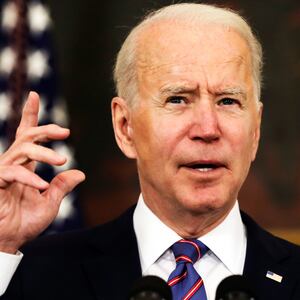Hours after the Biden administration announced that the remaining 3,500 American troops will return from Afghanistan by the twentieth anniversary of the Sept. 11 attacks, a Taliban spokesperson announced a refusal to join U.S.-facilitated peace talks between the Islamic group and the Afghan government.
“Until all foreign forces completely withdraw from our homeland, the Islamic Emirate will not participate in any conference that shall make decisions about Afghanistan,” Mohammed Naeem, a spokesperson for the Taliban’s political arm, said on Tuesday.
The boycott marks the latest blow to U.S. efforts to strike a deal between the militant group and the government ahead of a scheduled April conference in Istanbul that was viewed as pivotal to Washington’s residual vision for Kabul.
ADVERTISEMENT
A formal Taliban response to the prospective U.S. pullout was not expected until Wednesday when President Joe Biden is slated to formally announce the withdrawal in a speech. Aides said that, following a policy review, Biden decided to zero out forces several months after the original May 1 deadline that resulted from last year’s accord with the Taliban.
A crucial unknown in the U.S. withdrawal plan was whether the Taliban will consider Biden to have broken that deal by staying beyond the agreed-upon May 1 date. Biden is gambling that a four-month unilateral delay will not prompt the Taliban into a return to violence against departing U.S. forces.
Chris Kolenda, a retired Army colonel who has personally negotiated with the Taliban, cautioned that the Taliban have heard promises of U.S. withdrawal before. He expected the Taliban to require some form of additional material concession to accept a summertime withdrawal.
“What happens if four months becomes six, and six becomes eight?” Kolenda asked.
An ex-Taliban minister told The Daily Beast that the “Taliban is seriously disappointed with the U.S. for not obeying the historical Feb. 29, 2020 [deal] in which the U.S. made a clear commitment to pull out U.S. troops by the end of April 2021.” He explained that “by prolonging its presence in Afghanistan, the U.S. has shattered the Taliban’s trust.”
The ex-minister, who currently serves as a member of the Taliban military commission, asserted that “[The Taliban] is not tired of war. We have time. The U.S. should leave Afghanistan to Afghans.”
But Laurel Miller, a former State Department special representative for Afghanistan and Pakistan, had expected the Taliban to accept the delay, provided they see real evidence of U.S. withdrawal coalesce imminently.
“If it really looks certain that the U.S. is leaving by September, and the wheels will have to be in motion quickly—it will be in the interests of the Taliban to facilitate that, and that means not attacking U.S. forces on their way out,” Miller told The Daily Beast. “It’s also in their interest to preserve some possibility of good-enough relations with the U.S. and the rest of the world if and when they come to power.”
Shortly after the U.S. withdrawal announcement, the United Nations, Turkey, and Qatar announced that they will hold a long-anticipated conference on Afghanistan peace in Istanbul from April 24 to May 4, beyond the timeframe of the 2020 U.S.-Taliban accord. That conference is crucial to the Biden administration’s hopes of reaching a power-sharing deal between the government of Ashraf Ghani and the Taliban and staving off an outright battlefield victory and regime change by the Taliban.
Yet it is that conference that Naeem said the Taliban will not attend.
Biden has sought to end the U.S.’ longest overseas war, a war that he treated with skepticism and antipathy as vice president due to the U.S. inability to triumph. Last month he told ABC News it would be “tough” to withdraw by the negotiated May 1 deadline and criticized the U.S.-Taliban peace deal, brokered by the Trump administration.
Secretary of State Antony Blinken and Defense Secretary Lloyd Austin are scheduled to be in Brussels on Wednesday for discussions with NATO allies. They are expected to brief coalition partners on U.S. plans to withdraw.
It remains to be seen whether Republicans and hawkish Democrats on Capitol Hill will resist the withdrawal. Public opinion supports ending the war. Think tanks influential in Washington largely do not. Fears of a post-American collapse of the Afghan government and security forces, justified by Taliban military advances even after the deal and persistent security-force weaknesses, have driven elite discussion of Afghanistan since Biden took office.
Sen. Jim Inhofe, the senior Republican on the armed services committee, objected to the withdrawal and called the peg to the 9/11 anniversary “not conditions based.” A senior administration official told reporters that was correct. “A conditions-based approach, which has been the approach of the past two decades, is a recipe for staying in Afghanistan forever,” the official said.
Rep. Barbara Lee (D-CA), the only legislator to vote against the 2001 Authorization to Use Military Force, the legal wellspring of the Afghanistan war and other aspects of the post-9/11 “forever wars,” praised the apparent pullout. “This is the result of decades of hard work by activists, advocates, and members of Congress committed to ending our forever wars,” she said in a statement.
Miller said that while the U.S., the United Nations, and its allies will work diplomatically to sustain a peace effort with the objective of a power-sharing deal, “as soon as the words leave President Biden’s mouth and the effort turns to managing the withdrawal, the oxygen is going to be sucked out of the peace process. That probably suits the Taliban reasonably well at this stage.”
The senior administration official also said that al Qaeda currently lacks “an external plotting capability that can threaten the homeland.” Representatives from the Office of the Director of National Intelligence and the CIA did not substantively respond to a query about whether they concur with that assessment. Director of National Intelligence Avril Haines and CIA Director Bill Burns are set to testify on Wednesday before the Senate intelligence committee—which will become the first forum for legislators to stake out their positions on Biden’s withdrawal.
Restraining any residual al Qaeda presence on Afghan soil is the primary obligation of the Taliban under the 2020 accord. But the senior official indicated to reporters that while Afghanistan may soon no longer be a theater of the Forever War, Biden accepts that some version of the Forever War will continue. How much Biden will retain is the subject of a review currently underway by Jake Sullivan, his national security adviser.
“In 2021, the terrorist threat that we face is real and it emanates from a number of countries—indeed a number of continents—from Yemen, from Syria, from Somalia, from other parts of Africa,” the official said. “And we have to focus on those aspects of a dispersed and distributed terrorist threat, even as we keep our eye on the ball to prevent the re-emergence of a significant terrorist threat from Afghanistan through these repositioned counterterrorism capabilities.”








